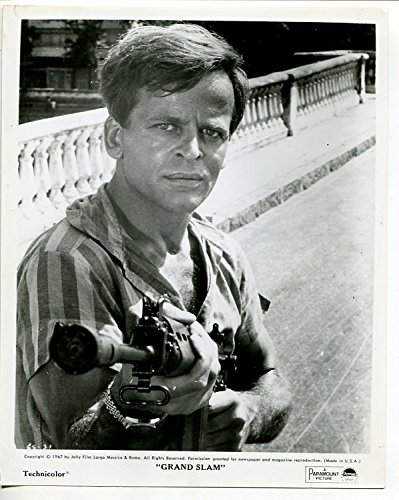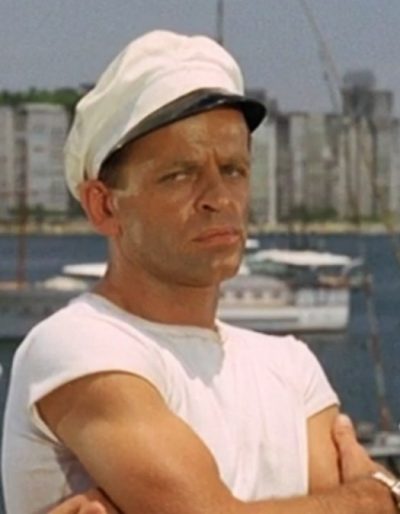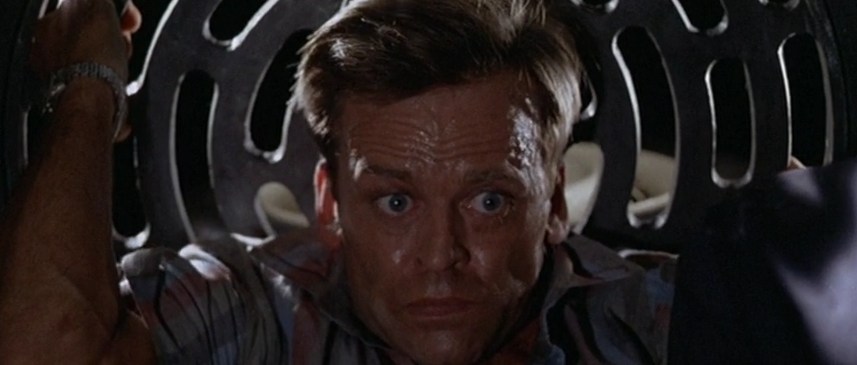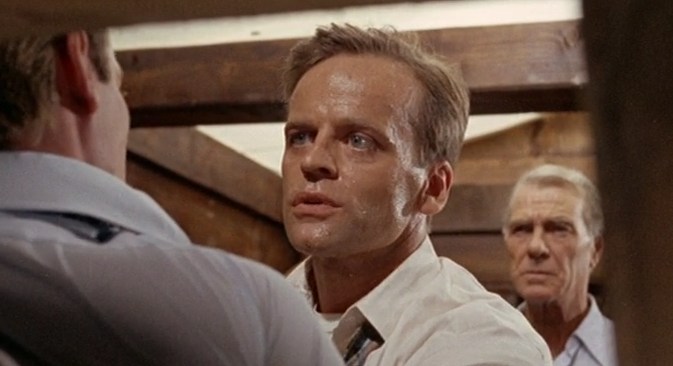Dir: Giuliano Montaldo
Star: George Rigaud, Klaus Kinski, Janet Leigh, Robert Hoffmann
a.k.a. Ad Ogni Costo
This straightforward yet very effective heist film kicks off with retired teacher James Anders (Edward G. Robinson) going to his old pal, Mark Milford (Adolfo Celi from Thunderball), a boss in the New York criminal underworld, with a plan for a diamond robbery during the Rio carnival. Milford introduces him to four men, who will each have a part to play in the proceedings. They are Gregg (Rigaud) the safecracker; Erich (Kinski) the muscle; Agostino the electronics wiz; and Jean Paul (Hoffmann), the playboy whose job is to seduce Mary Ann (Leigh), keeper of the key to the vault which will briefly contain ten million dollars worth of gems.
Naturally, things do not go quite as planned – where would be the fun in that? Mary Ann proves rather resistant to Jean Paul’s charms, and the target also installs an unexpected new counter-measure. It’s an audio-based alarm (the “Grand Slam” of the title), which will go off if it detects any sound louder than 14 decibels. Such as would be caused by drilling into the safe. Adding to the impetus is the ticking clock of the festival: for only the second time in 50 years, it coincides with the diamond delivery, creating the necessary window of opportunity. So if the gang of thieves can’t figure everything out in time, they’re going to have a very long way before there will be another chance.

Not helping matters is the friction between the team members. In particular Erich hates Jean Paul with a passion, at one point berating him, “You dirty pimp! You’re only good for charming old maids. You’re not even able to do a man’s job!” While that’s the most obvious case, you get the sense that no-one here is hanging out with the others for amusement, and it’s instead a relationship born entirely out of employment expediency. This becomes particularly relevant towards the end, when it becomes clear that the lack of trust among everyone involved here, is far from paranoia – and is, in fact, an entirely sensible defense mechanism for all concerned
It’s reported that Sergio Leone was originally going to direct this. It would certainly have been fascinating to see what the master of the Spaghetti Western would have done in the heist genre. While that never came to pass, regular collaborators editor Nino Baragli and compose Ennio Morricone were still involved with the project, and there are certainly moments where it still almost feels like a Leone work. However, it is considerably more jet-setting, with heavy use of location work, not just in Rio de Janeiro, but also New York, Rome and London, as Anders assembles his team. Cinematographer Antonio Macasoli wrings every cent of local color possible from there; it almost seems like Rio’s Sugarloaf Mountain is a supporting character in the film, such is its omnipresence.
Yet despite the presence of Morricone, one of the things that stands out is the use of silence. While most obvious during the heart of robbery, when the slightest noise would spell disaster, there are any number of other sequences, where Montaldo is content to let things unfold, without either the need for dialogue or background music. It stands in sharp contrast to modern films in the genre. The most recent one I saw was Ocean’s 8, and let’s just say, a little silence there would have been very welcome. Most of the characters here are prepared to let their actions do the talking instead. Erich is likely the most voluble of them, though occasionally topples over into incoherence. At one point, he says – and I checked this against the subs – “If you are really the supermen everybody says, crazy your brains! Tread blood!” Uh, what? At least it’s Kinski’s own voice here, which is nice.

Leigh is the best-known other name, and there were scenes where I could have sworn I was watching her daughter, Jamie Lee Curtis. But it seems more like a supporting role, and she doesn’t have much to do for the great bulk of the two-hour running time. I was more impressed by Rigaud, who comes over like an Argentinian version of Edward Fox; always calm, incredibly polite (when Anders meets Gregg, he’s working as a butler!), yet you can tell there’s steel beneath the silk. He becomes the de facto leader of the group, performing the very necessary task of damping down the enmity between Jean Paul and Erich. Those tensions threaten to tear the group apart before they can complete their task; it’s fortunate the pair’s work largely keeps them apart.
Erich’s borderline psychosis is somewhat ironic. For when Anders is assembling his team, he goes through Milford’s wonderful cabinet of ne’er-do-wells for hire, in a broad range of categories: “Aristocrats, Atomic Scientists, Card Cheaters, Charities, Clergy…” Anders is unable to decide between Military and Syndicate Killers, but eventually plumping for the former, presumably expecting them to be more disciplined. If so, the loose cannon in Mr. Weiss whom he hires is unlikely to be quite what the criminal mastermind had in mind. Yet there’s no doubt Erich knows his stuff, and has his part to play in the heist – even if he’s down in the sewers for much of it, these sequences contribute their share of tension.
It’s all a great deal of fun, although there’s a case to be argued that the ending goes for one twist too many. It feels like a bit of a stunt, and as such, perhaps devalues the understated quality of what has gone before. The rest of the film has been a solid combination of winning performances with a well-considered script, impressively committed to film by Montaldo and Baragli. It really doesn’t need a “surprise” in its tail, let alone about three of them, back-to-back. For this is a film which has spent about 110 minutes being at its most effective when at its most understated, and whose watchword has been “less is more.” An ending which is more M. Night Shyamalan than Sergio Leone seems ill-fitting, to put it mildly.

